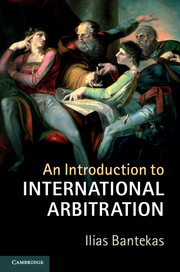Book contents
- Frontmatter
- Epigraph
- Contents
- Preface
- Table of cases
- Table of treaties
- Table of domestic laws
- Institutional Rules and Soft Law
- List of abbreviations
- 1 An introduction to international arbitration
- 2 The laws and rules applicable to arbitration
- 3 The agreement to arbitrate
- 4 The arbitral tribunal
- 5 Arbitration and the courts
- 6 The conduct of arbitral proceedings
- 7 Arbitral awards and challenges against awards
- 8 Recognition and enforcement of arbitral awards
- 9 Consumer and online arbitration
- 10 Investment arbitration
- Index
8 - Recognition and enforcement of arbitral awards
Published online by Cambridge University Press: 05 August 2015
- Frontmatter
- Epigraph
- Contents
- Preface
- Table of cases
- Table of treaties
- Table of domestic laws
- Institutional Rules and Soft Law
- List of abbreviations
- 1 An introduction to international arbitration
- 2 The laws and rules applicable to arbitration
- 3 The agreement to arbitrate
- 4 The arbitral tribunal
- 5 Arbitration and the courts
- 6 The conduct of arbitral proceedings
- 7 Arbitral awards and challenges against awards
- 8 Recognition and enforcement of arbitral awards
- 9 Consumer and online arbitration
- 10 Investment arbitration
- Index
Summary
Introduction
This chapter concerns the final phase of international arbitration. Many (or most) international awards ultimately need to be recognised and enforced in jurisdictions other than the seat in order for the winning party to satisfy its award. The process is not straightforward as the chapter demonstrates. We shall begin by distinguishing between pre-finality challenges, such as set aside remedies from challenges against a final award in a jurisdiction other than the seat, which constitutes the subject matter of this chapter. From there we shall discuss the differences between enforcement as such and recognition of a foreign award. Given that the most eminent and near-universally ratified treaty in the field of enforcement is the 1958 New York Convention, our discussion of formalities and applicable grounds of challenge against foreign awards at the forum (country of enforcement) will be predicated on the provisions of this instrument. The grounds for challenging foreign awards under the Convention are almost identical to set aside challenges and hence the pertinent discussion will only focus on their application to enforcement proceedings.
The chapter concludes with three complex issues peculiar to enforcement. Firstly, it is not entirely clear whether the forum may recognise and enforce an award that was set aside at the seat of the arbitration. The relevant discussion demonstrates that such an eventuality is legitimate and finds ample support from state practice. Secondly, it is equally unclear from the text of the 1958 New York Convention whether failure to raise objections or challenges against the award or the arbitral procedure prior to the award's finality at the seat precludes a subsequent challenge before the courts of the forum. As will be explained, national courts are fairly consistent in their preclusion of enforcement challenges raised for the first time by the claimant, particularly where the possibility of making these at earlier stages of arbitral proceedings existed. Finally, we look at the implications of the international law of sovereign immunity to enforcement proceedings against state property following the issuance of an arbitral award against a state. It should be stated from the outset that this chapter relates exclusively to international commercial – not investment – arbitration.
- Type
- Chapter
- Information
- An Introduction to International Arbitration , pp. 218 - 251Publisher: Cambridge University PressPrint publication year: 2015



